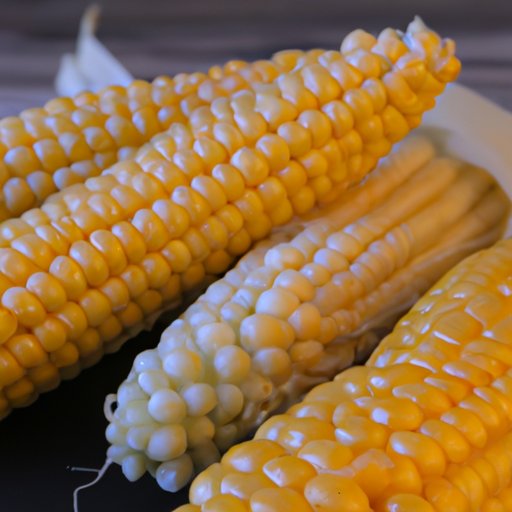Introduction
Corn is one of the most widely consumed food staples in the world. It is a type of cereal grain that comes from the plant Zea mays, which is native to Central America. Corn has been cultivated and eaten by humans since ancient times, and today it is found in many different forms, such as sweet corn, popcorn, whole kernel corn, cornmeal, and more. While corn is often thought of as a nutritious food, there are both benefits and drawbacks to consuming it. In this article, we explore the nutritional benefits and health risks associated with eating corn, and provide recommendations for incorporating it into a healthy diet.

Analyzing the Nutritional Benefits of Corn
Corn contains macronutrients, micronutrients, and dietary fiber. As a source of carbohydrates, corn is a good source of energy for the body. One cup of cooked corn provides approximately 31 grams of carbohydrates. Corn also contains small amounts of proteins and fats, although these are not significant sources of nutrition.
Corn is a good source of several vitamins and minerals, including thiamin, folate, iron, magnesium, phosphorus, potassium, zinc, and Vitamin A. These nutrients are essential for a variety of bodily functions, including metabolism, bone health, and immune system function.
Corn is also a good source of dietary fiber. Dietary fiber is important for digestive health and can help to lower cholesterol levels. One cup of cooked corn provides approximately 4 grams of dietary fiber.
Exploring the Health Risks Associated with Eating Corn
While corn is generally considered to be a nutritious food, there are some potential health risks associated with consuming it. Corn allergies and sensitivities are relatively common, and can cause symptoms such as nausea, vomiting, hives, and difficulty breathing.
In addition, corn can contain pesticide residues, depending on how it was grown. Pesticides can be harmful to human health, so it is important to buy organic corn whenever possible.
Finally, it is important to note that much of the corn produced in the United States is genetically modified. Genetically modified organisms (GMOs) have not been proven to be safe for human consumption, and may present unknown health risks.

Examining the Role of Corn in a Healthy Diet
Corn can be part of a healthy diet if it is consumed in moderation. The recommended amount of corn per day varies depending on age, sex, and activity level. Generally speaking, adults should aim for 1-2 servings of corn per day, while children should aim for 1 serving per day.
It is also important to consider other foods that you are eating in conjunction with corn. Whole grains, fruits, vegetables, lean proteins, and healthy fats are all important components of a balanced diet. Eating a variety of healthy foods is the best way to ensure that your body is receiving all of the nutrients it needs.

Comparing the Nutrient Profiles of Different Types of Corn
Different types of corn have different nutrient profiles. Sweet corn is higher in sugar than other types of corn, but it is still relatively low in calories. Popcorn is a good source of fiber, but it is usually high in sodium and fat due to the added seasonings. Whole kernel corn is higher in calories than other types of corn, but it is still a good source of vitamins and minerals. Cornmeal is high in carbohydrates and a good source of dietary fiber.
Investigating How Corn is Processed and Prepared for Consumption
The way that corn is processed and prepared for consumption can have an effect on its nutrient profile and health benefits. Fresh corn is the least processed form of corn and therefore retains the most nutrients. Canned corn is typically high in sodium, so it is best to opt for varieties that are labeled “low sodium” or “no salt added.” Frozen corn is a convenient option, but it may lose some of its natural sweetness during the freezing process. Dehydrated corn can be a good source of dietary fiber, but it is usually high in sodium and sugar.
Conclusion
In conclusion, corn is a nutritious food that can be incorporated into a healthy diet. It is a good source of carbohydrates, proteins, fats, vitamins, minerals, and dietary fiber. However, there are potential health risks associated with consuming corn, such as allergies and sensitivities, pesticide residues, and genetically modified organisms (GMOs). To ensure that you are getting all of the nutrients you need, it is important to eat a variety of healthy foods in moderation. Different types of corn offer different nutritional benefits, so it is important to consider the nutrient profile of each type before incorporating them into your diet. Finally, the way that corn is processed and prepared for consumption can have an effect on its health benefits, so it is important to be mindful of this when selecting corn products.
(Note: Is this article not meeting your expectations? Do you have knowledge or insights to share? Unlock new opportunities and expand your reach by joining our authors team. Click Registration to join us and share your expertise with our readers.)
